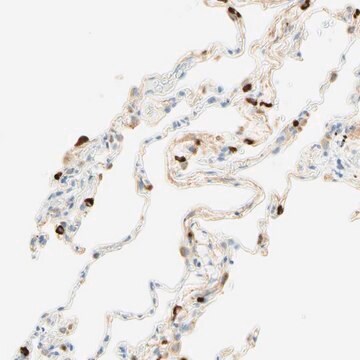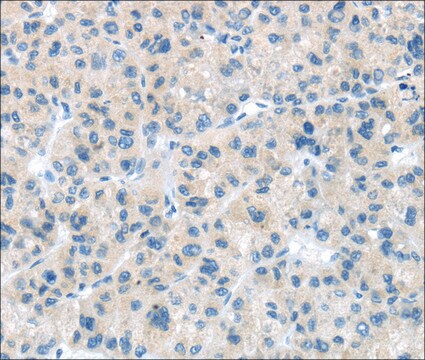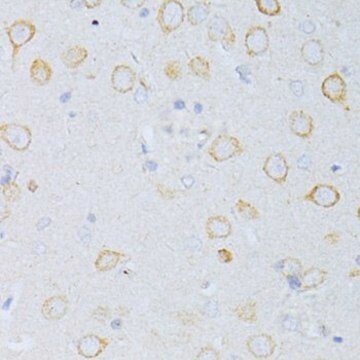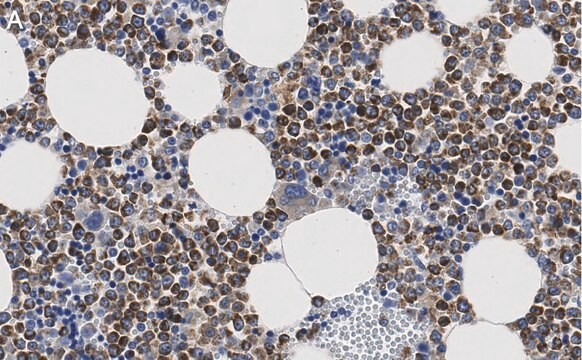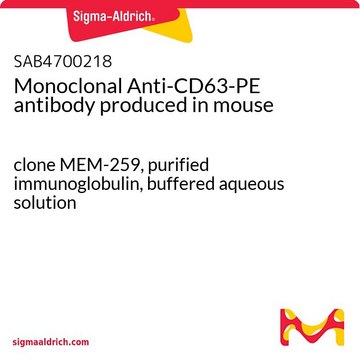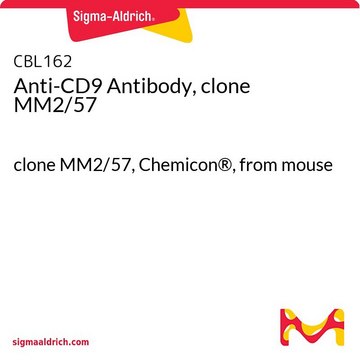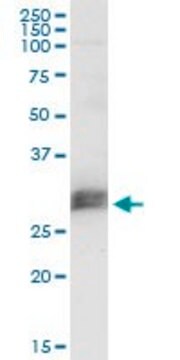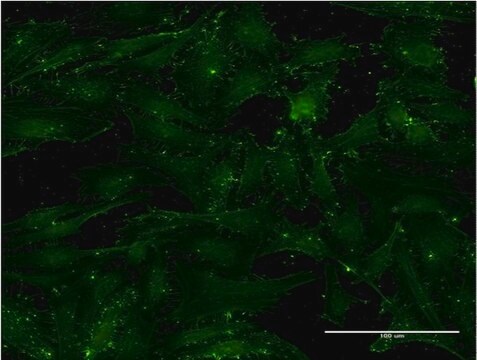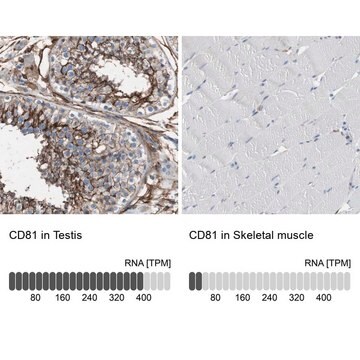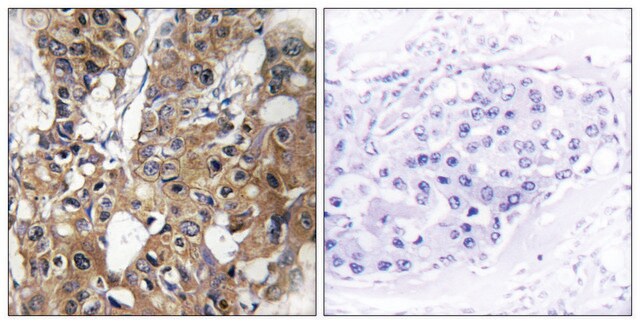SAB4700215
Monoclonal Anti-CD63 antibody produced in mouse
clone MEM-259, purified immunoglobulin, buffered aqueous solution
Faça loginpara ver os preços organizacionais e de contrato
About This Item
Código UNSPSC:
12352203
NACRES:
NA.41
Produtos recomendados
fonte biológica
mouse
Nível de qualidade
conjugado
unconjugated
forma do anticorpo
purified immunoglobulin
tipo de produto de anticorpo
primary antibodies
clone
MEM-259, monoclonal
Formulário
buffered aqueous solution
reatividade de espécies
human
concentração
1 mg/mL
técnica(s)
flow cytometry: suitable
Isotipo
IgG1
nº de adesão NCBI
nº de adesão UniProt
Condições de expedição
wet ice
temperatura de armazenamento
2-8°C
modificação pós-traducional do alvo
unmodified
Informações sobre genes
human ... CD63(967)
Descrição geral
Cluster of differentiation 63 (CD63), also known as melanoma 1 antigen, is encoded by the gene mapped to human chromosome 12q13.2. The encoded protein belongs to the transmembrane 4 superfamily (TM4SF). CD63 is an integral membrane glycoprotein expressed in late endosomes and lysosomes and is also present in the platelet dense granule membrane.
The antibody MEM-259 reacts with CD63 (LAMP-3), a 40-60 kDa tetraspan glycoprotein expressed by granulocytes, platelets, T cells, monocytes/macrophages and endothelial cells. Cell surface exposition of CD63 is usually activation-dependent.
Imunogênio
HPB-ALL T cell line
Aplicação
Monoclonal Anti-CD63 antibody produced in mouse has been used in flow cytometry and confocal imaging.
The reagent is designed for Flow Cytometry analysis. Suggested working dilution for Flow Cytometry is 2 μg/mL of sample. Indicated dilution is recommended starting point for use of this product. Working concentrations should be determined by the investigator.
Ações bioquímicas/fisiológicas
Cluster of differentiation 63 (CD63) is one of the platelet activation marker, which plays a vital role in platelet aggregation, adhesion to collagen, uptake of oxidized low-density lipoprotein (LDL) in vitro and regulation of angiogenesis. Inadequate expression of CD63 results in the autosomal recessive inherited disorder, Hermansky-Pudlak syndrome. CD63 is associated with various cellular functions, such as cellular adhesion, cell differentiation, migration, carcinogenesis and tumor progression. CD63 is highly expressed in the initial stage of Merkel cell carcinoma and decreased in later stages; therefore, CD63 is considered to be a potential prognostic factor for this malignancy.
Características e benefícios
Evaluate our antibodies with complete peace of mind. If the antibody does not perform in your application, we will issue a full credit or replacement antibody. Learn more.
forma física
Solution in phosphate buffered saline, pH 7.4, with 15 mM sodium azide.
Exoneração de responsabilidade
Unless otherwise stated in our catalog or other company documentation accompanying the product(s), our products are intended for research use only and are not to be used for any other purpose, which includes but is not limited to, unauthorized commercial uses, in vitro diagnostic uses, ex vivo or in vivo therapeutic uses or any type of consumption or application to humans or animals.
Não está encontrando o produto certo?
Experimente o nosso Ferramenta de seleção de produtos.
Código de classe de armazenamento
10 - Combustible liquids
Ponto de fulgor (°F)
Not applicable
Ponto de fulgor (°C)
Not applicable
Escolha uma das versões mais recentes:
Já possui este produto?
Encontre a documentação dos produtos que você adquiriu recentemente na biblioteca de documentos.
Os clientes também visualizaram
Detection of phosphatidylserine-positive exosomes as a diagnostic marker for ovarian malignancies: a proof of concept study
Lea J, et.al.
Oncotarget, 8, 14395-14407 (2017)
Jayanthi Lea et al.
Oncotarget, 8(9), 14395-14407 (2017-01-26)
There are no suitable screening modalities for ovarian carcinomas (OC) and repeated imaging and CA-125 levels are often needed to triage equivocal ovarian masses. Definitive diagnosis of malignancy, however, can only be established by histologic confirmation. Thus, the ability to
Gene expression signature associated with BRAF mutations in human primary cutaneous melanomas
Kannengiesser C
Molecular Oncology, 1, 425-430 (2008)
Tra-Ly Nguyen et al.
Cancer research, 78(18), 5384-5397 (2018-07-29)
The mTOR is a central regulator of cell growth and is highly activated in cancer cells to allow rapid tumor growth. The use of mTOR inhibitors as anticancer therapy has been approved for some types of tumors, albeit with modest
Improved metabolic control decreases platelet activation markers in patients with type-2 diabetes.
Eibl N
European Journal of Clinical Investigation, 34, 205-209 (2004)
Nossa equipe de cientistas tem experiência em todas as áreas de pesquisa, incluindo Life Sciences, ciência de materiais, síntese química, cromatografia, química analítica e muitas outras.
Entre em contato com a assistência técnica